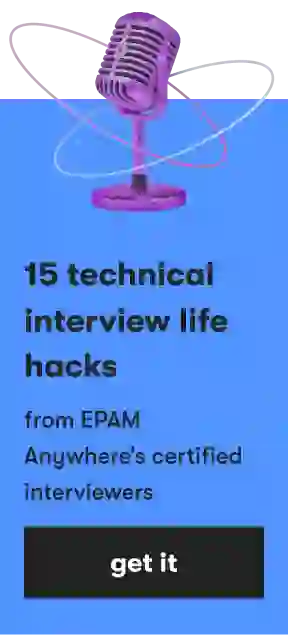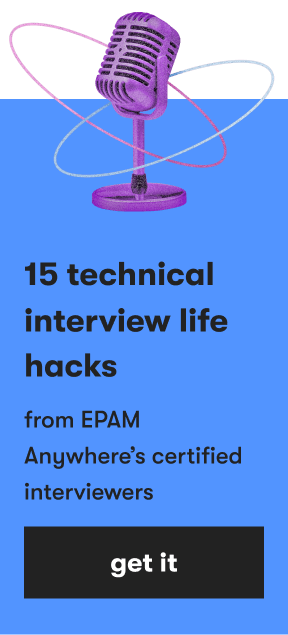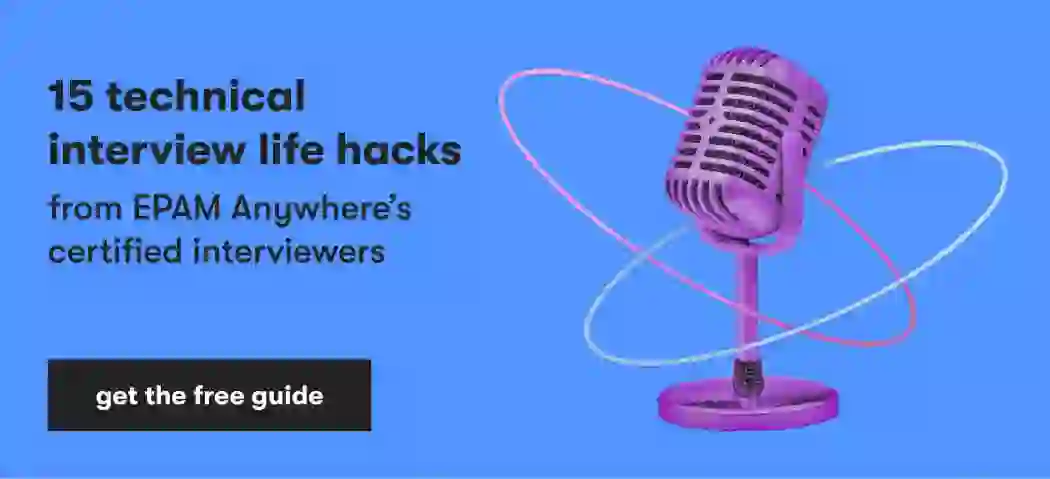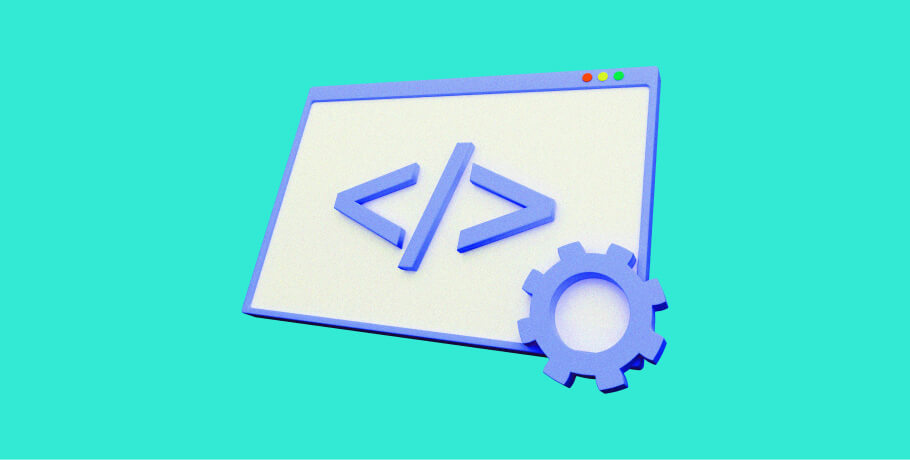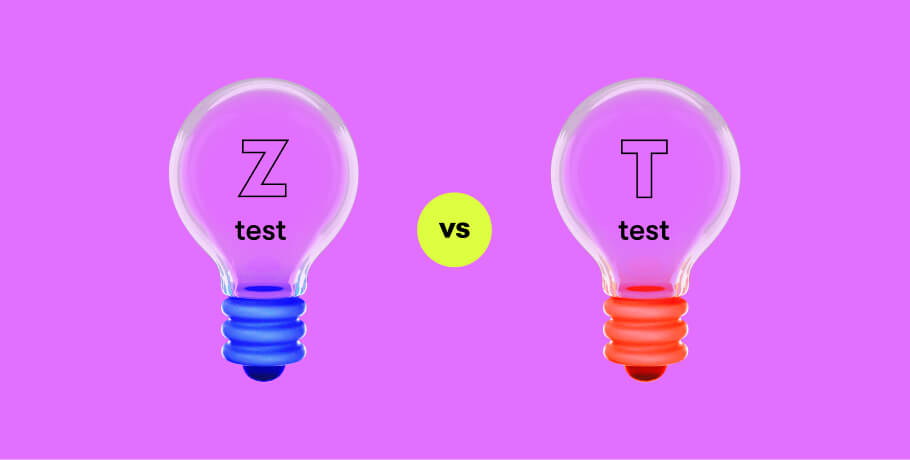The interview process for technical positions at EPAM Anywhere is similar to the traditional approach at most tech companies. That means we incorporate technical interviews into our process to assess our candidate's expertise, logic, and creative approach to complex tasks. The hiring of JavaScript engineers is no exception.
Enhancing your preparedness is why we, together with Roman, a Senior Software Engineer at EPAM Anywhere, are sharing typical JavaScript interview tasks and the questions that our technical advisors ask in technical interviews. Let's check them out!
1. Background check: interview questions for senior javascript developers
At this initial stage, developers who work with JavaScript and related technologies on real projects at EPAM Anywhere check a candidate’s technical background, expertise, previously passed courses, and a sample of past projects.
During senior JavaScript developer interviews, our interviewers tend to focus on previously completed projects and the candidate’s contributions to the success of those projects, rather than formal education and courses. If a candidate has little experience in commercial development, JS interview questions may focus on projects performed during studies, pet projects, and similar indicators of interest and ability.
Here are a few pro tips for a successful background check:
- Recall significant moments from previous work experience. Frequently, interviewers ask about the most challenging tasks or complex decisions that a developer had to address on a previous project. Prepare for this in advance so you can showcase your expertise and stay confident during your interview.
- Talk about specific tasks that you worked on. Be truthful and don't steal the thunder of your former colleagues. It would be disappointing to both you and the interviewer to realize that you don’t have the relevant experience to complete JavaScript tasks for an interview or, even worse, for a real-life project.
- Prepare for typical JavaScript questions. Usually, interviewers ask senior front end developer questions about the technical description of a project, core technologies, code testing approaches, the overall level of code quality, and performance optimization techniques. In addition to hard skills, interviewers also check work experience in geographically distributed teams, project planning, and time management approaches.
2. Core technology check: JavaScript interview tasks
While the first step focuses on some general interview questions for senior JavaScript developers, this stage focuses on your theoretical knowledge of JavaScript and its frameworks, such as Angular, React, and Node.js, and on practical coding tasks.
You could be asked general JS questions about the:
- Difference between an event loop, a microtask, and a macrotask;
- Promise and peculiarities of working with JS;
- Prototypes and prototype inheritance; and
- General pros and cons of JavaScript, its domain, and use cases.
Other JavaScript senior interview questions you can expect may focus on specific JavaScript frameworks and libraries. For example, questions asked when hiring React.JS developers may include:
- Different approaches to state management and the advantages and drawbacks;
- Virtual DOM and what it's used for; and
- What JSX is, and some advantages and drawbacks of the technology.
Usually, interviewers ask 3-4 theoretical questions and this session lasts for 10-15 minutes.
Practical JS interview tasks
The next step involves JavaScript coding tasks. Typically, developers solve 2-3 algorithmic tasks that check their ability to work with JavaScript and its libraries. One of our JavaScript Engineers shared his experience with JavaScript task for interview:
I had to solve a simple algorithmic task that required me to review the string and count the number of symbol entries. Another task was to write a simple React component that used useState and useEffect hooks. Then, I had to explain the output of the JavaScript code that consisted of synchronous code, Promises, and setTimeout with different timeouts. Even though I wasn't completely sure about my answer, I described how I'd use that code on a real project, and how I'd check its performance ability.

JavaScript interview tasks are usually of the same approximate level of difficulty, and they touch on various aspects of JavaScript. The process of solving the tasks takes the form of a dialogue between you and the interviewer, and there's no pressure. You will likely get hints from an interviewer if you get stuck, and you can discuss alternate options for solving the task.
JS tasks for interview: final thoughts
Keep in mind that there's no single perfect answer to the JavaScript interview questions asked during technical interviews. To pass the interview, stay confident and be honest with your interviewer. Don't be afraid of making a mistake or explaining that you don't know the right answer. A technical interview isn't a school exam. It's a two-way street that helps us determine if a candidate is suited for a position and if an available position is suited for a candidate.
Also, don't spend too much time memorizing terms, definitions, and principles of JavaScript and its frameworks. An experienced interviewer will notice if you simply learned the concepts but you don't know how to apply them in real life. Even though general knowledge of key concepts is useful, it only works when you can put it into practice.
We hope this information and the sample JavaScript interview questions will help you prepare thoroughly and land your dream job at EPAM Anywhere. Check our remote JavaScript developer jobs and this guide to technical interview questions to help you prepare. We'll get in touch to help you pick something best suited for you.

As Chief Editor, Darya works with our top technical and career experts at EPAM Anywhere to share their insights with our global audience. With 12+ years in digital communications, she’s happy to help job seekers make the best of remote work opportunities and build a fulfilling career in tech.
As Chief Editor, Darya works with our top technical and career experts at EPAM Anywhere to share their insights with our global audience. With 12+ years in digital communications, she’s happy to help job seekers make the best of remote work opportunities and build a fulfilling career in tech.
Explore our Editorial Policy to learn more about our standards for content creation.
read more

